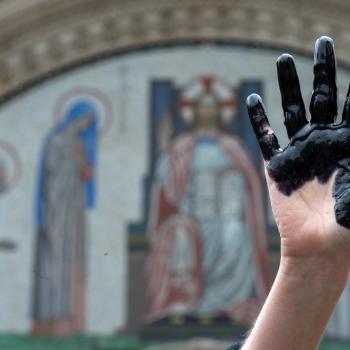When we are possessed by feelings of unworthiness, we are wise to follow the ways of this woman. We need to be persistent in our effort to access Jesus. Like the Canaanite woman, we must desire healing so fervently that we are willing to struggle with God. The Lord tells us in one parable that sometimes it will seem as if he is an uncaring and unjust judge, but that if we are persistent, even such a judge will yield to our desire for justice (Luke 18:1-8).
We should also notice the way in which the woman was persistent. She wasn't belligerent or rude about it. Even after Jesus's apparent disregard for her problem, the text shows us that she worshipped him. Only in a worshipful, hopeful approach to Jesus do we access the healing revealed in this story.
Lastly, we should remember the woman's motivation. She succeeded in winning the healing from Jesus because the passionate love she felt for her daughter empowered her. Spiritual healing and growth are inherently based in love. If we think about it rationally, we come to see that a sense of worthlessness hinders our ability to give and receive love. It makes us morose and trapped within ourselves. This state of mind affects those around us negatively. Our sense of worthlessness causes us to medicate our emotions with bad habits and addictions. These, in turn, hurt those around us. When we are tired of hurting those around us, love will lead us to Jesus's healing. If we are tired of the way our self-depreciation inhibits our ability to love and connect with others, if we are saddened by the way our self-hatred affects others negatively, then we will be empowered to tenaciously petition God for healing until we receive what we want. Love will drive us to take God to court, his own court, and quote back to him his own words. We might pray in this way:
Dear Lord Jesus,
You made me. You know everything about me and I admit to you that I feel worthless. I have tried my best and failed. I did not ask to be born like this. I need help! You have promised to help those who come to you. You have promised to be a faithful God. I am knocking on your door. I am seeking for you to be real in my life. I am asking you for help! I can't do this on my own. I don't know what else to do but beg you for help. You must help me. By your very words, you are obliged to help me!
But there is another angle within this story. We read that the disciples were dismissive toward her. Unlike Jesus, they did not heal her daughter. It is likely that they could not have healed her even if they had tried. And unlike Jesus, they were condescending toward her because they believed themselves to be more important and worthy than a Canaanite woman. We see the disciples' propensity for a sense of self-importance in the repeated arguments between the disciples about who would be the greatest among them.
There's a part of us that, like the disciples, feels self-righteous and condescending toward others. This is often true even when we loathe ourselves and deem ourselves unworthy of life. In fact, I have noticed that the two appear to be yoked together. The more I judge others, the more I judge myself. The more I judge myself, the more prone I am to judge others. The two, self-deprecation and disdain for others, are intrinsically united. It is as Jesus said, "Do not judge, so that you may not be judged" (Matt. 7:1). The two attitudes of worthlessness and smugness are bound together in the false notion of hierarchy.
Feelings of worthlessness can only arise when we believe in a hierarchy of humans. But hierarchies don't apply to a person's inherent value. It is manifestly clear that our God, Jesus, loves all people equally. We are all his children. We are all worthy of his love. Jesus does not play favorites or withhold his infinite love from anyone for any reason. Think of the prodigal son. When we know that there is no hierarchy, that we are all equally made in God's image and likeness, then we know that we are neither less worthy nor more worthy of God's love, healing, and life.
So part of the healing Jesus is offering us in this story is contained within the truth that all human beings are equally God's beloved children—Jew and gentile, man and woman, healthy and ill, disciple and non-disciple. This truth not only heals us of feeling like a little dog, it also empowers us to love other people without reservation.
The woman was suffering under a society based in hierarchy. Males, Jews, and healthy specimens were at the top of the heap. Non-Jewish women with sick daughters were at the bottom. Jesus proved to her that the societal hierarchical beliefs were totally false. Many of us suffer under a different internal hierarchy. We may believe that people who are successful are more "valuable," which, when we think about it, means more worthy of life and God's love. Or maybe we believe that people of a certain faith or culture are at the top of God's list. We may believe that people who are emotionally and spiritually strong are better than those who are weak. When our consciousness is ordered in a hierarchical way, we suffer the plight of this woman. We at some level feel unworthy of even of being alive. We feel like a little dog. And this diseased attitude is just like the demon that possessed the little girl.




